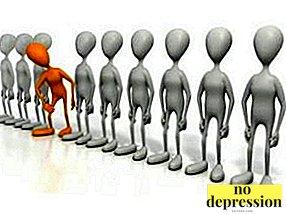Each of us faced such situations when it is difficult for us to decide on something or to take the optimal decision due to our emotions and fears. In this article I will talk about one method that will help you learn to make the right decisions and move from thoughts to action.

To make it clear what is at stake, I will immediately give an example. Suppose you are thinking about changing jobs. But you are experiencing an unaccountable fear associated with the fact that you have to leave the usual place, you will need to look for something new. You are not too confident in yourself, in your strengths and professional qualities. Not because you really are not capable of anything, but because you are accustomed to belittle your strengths and exaggerate shortcomings.
You feel anxious about the fact that you have to go on interviews, talk about yourself, worry and be nervous. Together with these fears, there are still a lot of small internal barriers that prevent you from starting to search for new opportunities. And all this together forms a strong emotional attachment to the current place of work, let you there and not satisfied, and you have long wanted to leave this place in secret. It just bothers fear.
When the Pro et Contra method does not work
What happens when you try to come up with some rational decision about a job change? You start thinking and arguing for and against the decision to quit. This is where the danger lurks.
Your mind is already subject to fear, doubt and uncertainty. Despite your desire to find a job that suits you best, the decision to stay in the same place more closely matches your current "comfort zone" (familiar setting, colleagues, certainty, etc.) than the decision to leave. It can be difficult for a person to leave this zone. And so his mind will seem to be attracted to the decision "against" dismissal by a magnet. Let this decision be stupid and irrational, but a person will not always know about it!
It will seem to him that his decision is dictated by considerations of logic and common sense! Indeed, fear and insecurity do not always manifest themselves as relevant emotions. They are rationalized, masquerading as arguments of reason. You will not always think: “If I wanted, I would be able to move to another job with better conditions, but some fears and emotions prevent me, internal restrictions, whereas, in reality, nothing bothers me. All that you need to - get rid of fear and act. "
Of course, it would be very good if you immediately thought about your fears, as about irrational impulses, and not about objective restrictions. But this is not always the case.
You think: “I can’t do anything. I won’t find a job for a lot of money. Probably, it’s wrong to change jobs so often, it will spoil my work record.” Sometimes the demands of the labor market, your skills can really become objective barriers, but it often happens that such arguments are simply a rationalization of your fear and have nothing to do with reality.
How to separate emotions from logic? How to separate your far-fetched fears from real obstacles that exist in life? How to understand where your emotions end, and the real world begins with its laws?
I will talk about one method that helps me a lot to move from thoughts to action and make the right decisions.
Method
Instead of solving the pros and cons dichotomy, draw in your mind an image of some kind of "ideal I". This “ideal self” is not in doubt, it is self-confident, it doesn’t matter what others think about it, it does not depend on fears and emotions, it takes responsibility for itself and, in the end, it is strongly interested in achieve goals, act, instead of thinking all day "to be or not to be."
This “I”, although perfect, is somehow based on your real possibilities. That is - this is not some kind of superman with the appearance of a Hollywood actor, but it is you yourself with your capabilities, just these possibilities are brought to a high level of development. You are lazy, but the "ideal self" is not. You are afraid, but the "ideal self" does what it sees fit, despite fear. It is free from internal restrictions.
Maybe this way so there is in everyone's head. Many of us would like to be stronger, more disciplined, strong-willed and strong. It is this “I” that combines all the moral qualities that you would like to have (and can have). Now think, what would the "ideal self" do in your situation of choice? Remember, this alter-ego does not care about any doubts, he wants the best conditions for himself and he is keen on this. He will not take anything on faith until he is convinced of it. He will not stop after several failures, but will go to the end!
He is not invincible, he is also subject to the vicissitudes of fate and he can also depend on people. Simply, it is a more perfect person than you.
So, what would the "second self" choose? Stay on unloved work or look for new opportunities for yourself?
Attention! The most important point here is that the likely actions of the "ideal self" are not necessarily a direct indication for your actions!
After all, the "ideal self" is perfect for surpassing you in capabilities and making the most correct decisions.
But you are not perfect, accept it. A person depends on his emotions and fears, and sometimes these emotions leak into the decision-making area. This is normal, such is a man. If you came to the conclusion that your "ideal self" would give up the current work and go in search of a new one, then you do not have to immediately repeat its possible actions!
Sometimes we cannot choose one of two solutions, because, in fact, we are afraid of this decision, because it takes us out of the comfort zone, and our mind in a cunning way pushes us to the opposite. We are not obliged to make any decision here, we are not you need to quit your job, just because you should do it in the ideal way. Therefore, we have nothing to fear, because there is no solution! No decision - no reason for fear. No fear - no self-deception and doubt! And the absence of illusions gives you the opportunity to objectively and remotely look at the problem and realize your fears. You do not need to make any decisions now, whatever thoughts you may have! What are you afraid of? Give thought to the will, be extremely honest with yourself.
Perhaps your ideal self would not make the decision that you made as a result of a tedious and meaningless analysis of the two alternatives. This means that there are no objective restrictions for dismissal and all that bothers you is your fears, because if you were perfect you would act differently!
Yes, you are afraid, because you are not perfect, people experience emotions that affect their life choices and this is normal. But now you are aware that you are simply afraid.
You don't have to do something right there, just accept this fact.
But now you know that nothing prevents you from finding better working conditions for yourself, except for your inner fears. Maybe you will understand that everything is much easier than you thought and you just need to stop sitting in one place and choose between the pros and cons. You make sure that you need to act. Perhaps you will not act immediately, because you are afraid. But now, you know what really bothers you. And after some time you will naturally come to the right decision, overcoming your fears.
You will know what to direct your attention to: your doubts. You just need to drop them and move forward.
And if you never come to this decision, then at least you will deceive yourself less about the nature of your doubts.
It is possible that you will come to the opposite conclusion and realize that the “ideal me”, even though it is self-confident and is not afraid of anything (it is bold, but not reckless!), Decides to stay at work. It means that there really are some objective reasons for this decision and only your fears and internal doubts do not cause it.
Honesty towards yourself
Anyway, this method will help you to understand yourself, to overcome the inertia of emotions that binds your thoughts, free your mind from the fear that binds it.
Use this method when making any life decisions when you begin to be tormented by fear of leaving the familiar comfort zone: when changing jobs, when deciding about organizing your own business, when making expensive purchases, when meeting people of the opposite sex, when forming relationships ...
“I am afraid to approach this girl and have already invented a dozen reasons that justify my fear. But what would the perfect self do? ”
“I can't decide to start my own business. It seems to me that failure will befall me. But what would the perfect self do? Wouldn't it even try? ”
“I don’t want to ask the employer for a promotion, although I have a suspicion that they can satisfy my request. But what would the perfect self do? He knows no stupid fears and insecurities! ”
Even if this will not help you act in each case and you will not be able to cope with your fears, at least you will be honest with yourself. And honesty is a pledge of destruction of illusions and the basis of rational actions. Sooner or later, honesty will lead you to action, since it is very difficult to be honest with yourself and, at the same time, go against your thoughts. Only deception allows people to remain comfortable in ignorance and inaction for a long time.



